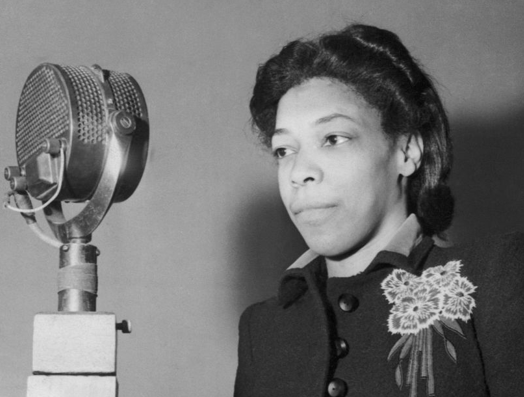A NEW library named after the first Black BBC radio producer has opened in south London.
Una Marson was a Jamaican writer, activist and poet who arrived in the UK in 1932.
The new Una Marson Library was opened by Southwark council, marking a key milestone in the ongoing redevelopment of the Aylesbury area.
Leader of Southwark Council, Councillor Kieron Williams, said:“I’m delighted to announce the opening of the Una Marson Library – a significant milestone in the renewal of the Aylesbury area. It’s a fantastic space for our whole community, and the sixth new library we have opened in Southwark since 2010.
“Like all of our libraries, there is of course a wonderful selection of books, but that’s just the beginning. Today we are also opening the doors to another haven for our community. A place to relax, learn, meet and be inspire, whether you one or ninety-one. Una Marson was an inspiration to thousands, so it is absolutely fitting that this inspirational space is named after her.”
History-maker

Marson is a treasured Southwark heroine who is hailed for her contributions to the literary world.
During the Second World War she was the first Black woman programme maker at the BBC.
She broadcasted messages from servicemen and women in England, to their friends and families in the Caribbean, in her popular weekly series: Calling the West Indies
When Marson first arrived in the UK she lived with renowned Black activist Dr Harold Moody, in Peckham.
The council said the library’s name was selected by the local community to honour Southwark’s rich cultural heritage.
The new library will provide traditional services such as book and DVD loans, newspapers and periodicals, public access PCs, printing and copying facilities, bookable meeting rooms, study spaces, free Wi-Fi and a self-service health kiosk. In addition, a full programme of engaging events will offered throughout the year.
The library also includes an innovation space, which provides the opportunity to trial new programmes and services.
In 2009, a Blue Plaque was unveiled at Marson’s former home on Brunswick Square in Camberwell.
To find the library, visit: Una Marson Library, 62 Thurlow Street, London, SE17 2GN
opening times: Monday, Tuesday, Thursday and Friday 10am to 6pm, Wednesday 10am to 3pm and Saturday 10am to 5pm


Comments Form
2 Comments
Ms Una Marson was an African-Caribbean heritage writer, activist, and poet, who came to England, from Jamaica, in 1932; and worked as a BBC Radio Broadcaster.
Ms Marson has the distinction of being the BBC’s first African-Caribbean programme producer, and broadcaster.
The BBC Establishment welcomed her.
Ms Marson broadcasted messages from servicemen and women in England, to their friends and families in the Caribbean, in her popular weekly series: Calling the West Indies.
In November 1942 England’s most renown author and essayist, Mr George Orwell asked Ms Marson to contribute to the six-part poetry magazine ‘Voice’, broadcast on the Indian Section of the BBC’s Eastern Service.
Ms Marson contributing to the fourth programme dedicated to American poetry, which also featured Mr William Empson.
The association with Mr George Orwell, the author of 1984, led Ms Marson to devise a similar programme for the West Indies, titled ‘Caribbean Voices’, which in later years under the direction of Henry Swanzy would introduce authors such as Mr George Lamming, Mr Sam Selvon, Mr V. S. Naipaul, and Mr Edward Kamau Braithwaite to a wider audience.
The programme ran for fifteen years until 1958.
However, in 1945, Ms Marson returned to the Caribbean, exhausted by the hostile correspondence she received from native Caucasian listeners.
Una Marson was a Jamaican writer, activist and poet who arrived in the UK in 1932.
She broadcasted messages from servicemen and women in England, to their friends and families in the Caribbean, in her popular weekly series: Calling the West Indies.
In November 1942 George Orwell asked her to contribute to the six-part poetry magazine ‘Voice’, broadcast on the Indian Section of the BBC’s Eastern Service, with Marson taking part in the fourth programme dedicated to American poetry, which also featured William Empson.
Ms Una Marson was an African-Caribbean heritage writer, activist, and poet, who came to England, from Jamaica, in 1932; and worked as a BBC Radio Broadcaster.
Ms Marson has the distinction of being the BBC’s first African-Caribbean broadcaster.
The BBC Establishment welcomed her.
Ms Marson broadcasted messages from servicemen and women in England, to their friends and families in the Caribbean, in her popular weekly series: Calling the West Indies.
In November 1942 England’s most renown author and essayist, Mr George Orwell asked Ms Marson to contribute to the six-part poetry magazine ‘Voice’, broadcast on the Indian Section of the BBC’s Eastern Service, with Ms Marson taking part in the fourth programme dedicated to American poetry, which also featured William Empson.
The association with Mr George Orwell, the author of 1984, led Ms Marson to devise a similar programme for the West Indies, titled ‘Caribbean Voices’, which in later years under the direction of Henry Swanzy would introduce authors such as Mr George Lamming, Mr Sam Selvon, Mr V. S. Naipaul, and Mr Edward Kamau Braithwaite to a wider audience.
The programme ran for fifteen years until 1958.
However, in 1945, Ms Marson returned to the Caribbean, exhausted by the hostile correspondence she received from native Caucasian listeners.